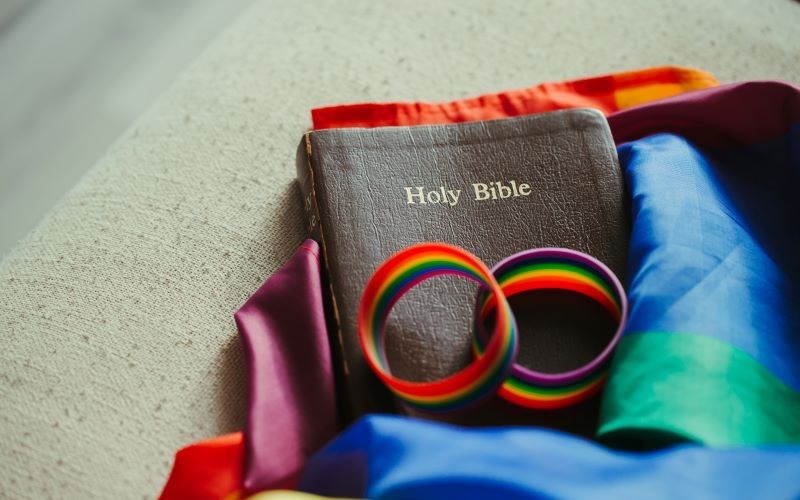Holy, holy, holy, is the Lord God Almighty, who was and is and is to come!
(Revelation 4:8).
God is love, and whoever abides in love abides in God, and God abides in him
(1 John 4:16).
The two passages above represent a both/and relationship rather than an either/or.
God is eternally and simultaneously holy and love. He is completely and absolutely both at the same time forever.
Neither can ever be subjugated to the other.
One of the biggest problems with today’s Christianity is that it appears, through its teachings and practice, to have clearly subjugated God’s holiness to His love.
A case in point would be the advice of long-time evangelical pastor and church leader Alistair Begg to a grandmother who was torn about whether or not to attend the wedding of her grandson to a transgender person. Although there is confusion about the specifics (which gender was the transgender person transitioning from and is the grandson homosexual?) what is not confusing is that Begg knew he was giving advice about an unbiblical wedding.
After asking the grandmother if her grandson knew that she did not approve of his lifestyle choices and receiving an affirmative answer he advised:
“Well then, okay. As long as he knows that, then I suggest that you do go to the ceremony. And I suggest that you buy them a gift.”
I’ll get into his reasoning for that advice in just a moment. The issue is quite simply whether or not a Christian should attend (and bless, i.e. bring a gift to) an unbiblical wedding ceremony. Begg’s advice leans heavily on God’s love. But what about God’s holiness? Can you attend an unbiblical wedding as an act of love while still maintaining the holiness of God? On the flipside, can you abstain from attendance out of reverence for God’s holiness and still love the people involved? (I will answer this dichotomy at the end.)
First, let’s look at Begg’s reasoning concerning his advice to this grandmother:
“Your love for them may catch them off guard, but your absence will simply reinforce the fact that they said, ‘These people are what I always thought: judgmental, critical, unprepared to countenance anything.’”
On the surface that sounds entirely reasonable, hopeful, and loving. But there are some implications about that explanation that need to be examined.
If Christians should attend and bless unbiblical weddings then…
One: Making disciples is predicated on instilling happiness in people
Begg’s explanation seems to suggest that the grandmother’s Christian witness will be out the window if she passes on attending the unbiblical wedding.
In the Great Commission, Jesus said,
Go therefore and make disciples of all nations…teaching them to observe all that I have commanded you (Matthew 28:19-20).
We know that learning is often a difficult and painful process. Whether you are talking about academics or the ‘school of hard knocks.’ That phrase “teaching them to observe…” often precludes feeling good about ourselves or making sure everyone around us feels good about us. Not only is Jesus the Son of God, but He is the Savior as well. What does He save us from? In Mere Christianity C.S. Lewis said,
“If you look for truth, you may find comfort in the end: if you look for comfort you will not get either comfort or truth – only soft soap and wishful thinking to begin with and, in the end, despair.”
Being a faithful witness for Christ doesn’t mean affirming the sin a person already knows you have an issue with. Begg’s advice is laden with “wishful thinking.”
Two: Truth is often unproductive
Begg’s reasoning for his advice assumes that if the grandmother doesn’t attend her grandson’s so-called wedding it will merely reinforce his negative views of Christianity. However, I would suggest just the opposite. If the grandson already knows his grandmother disapproves of his lifestyle choices based upon her faith but she attends anyway, wouldn’t he assume her attendance means she is compromising her religious views or, even worse, that her religious beliefs are bogus and she knows it?
Most people in the world know either explicitly (as in chapter and verse) or implicitly that Christianity teaches “Flee from sexual immorality” (1 Corinthians 6:18). There has been enough evangelism throughout the world for nearly everyone to know that the Bible teaches that any sex outside of the marriage of a man and a woman is immoral.
Almost everyone also knows, that in a biblical marriage, everyone present is affirming what the couple is doing and is going to do. It is a blessing of and from God. And yet somehow, Begg believes that despite what Paul says in Ephesians 5:11-12 the grandmother should attend.
Take no part in the unfruitful works of darkness, but instead expose them. For it is shameful even to speak of the things that they do in secret.
Never be afraid of or ashamed to stand for the truth. That will be a far bigger witness than demonstrating a willingness to compromise.
Three: The Bible is wrong about sin
Pastor Begg knows that Scripture teaches:
[T]he wages of sin is death (Romans 6:23).
He conveyed that the grandmother had clearly expressed her disapproval of her grandson marrying a transgender person. Unsaid but implied is that her disapproval was based upon her religious convictions. In other words, she opposed the ceremony based on her belief that it was going to be a sinful union. And yet he encouraged her to attend and bring a gift anyway. So she was to affirm and celebrate what both she and Pastor Begg knew to be sinful and knew that without repentance would ultimately end in disastrous and horrific (eternal) consequences? In his view, that is the loving and compassionate thing to do? Only if Romans 6:23 isn’t true.
Four: God’s holiness is not equal to His love
My understanding is that Pastor Begg has long been a champion of biblical marriage. He knows what it is and what it isn’t. If he knows that the grandmother’s grandson is entering into an unbiblical marriage (which he does) then the only way his advice to her makes any sense is if God’s holiness is overshadowed by His love. If the holiness of God can tolerate an unbiblical marriage it can only be because the love of God has overruled His holiness. Therefore, they cannot be equal.
Another way to look at it would be the reverse. The holiness of God must have been greater than the love of God as Jesus suffered on the cross. More holy than loving. Justice over compassion.
No, no, no!
God is perfectly holy forever. God is perfectly loving forever. Neither attribute is ever subjugated to the other. God’s love and His holiness were on display at Calvary. His holiness required the perfect sacrifice and His love provided it.
Begg’s advice to the grandmother requires God’s holiness to remain hidden in the shadows while His love smooths the unrepentant sin over.
For decades the homosexual community knew that it was only a matter of time until cultural views on homosexuality changed. But it also knew that the bigger challenge was to overcome the biblical views of the church concerning sexuality. How do you overcome the fact that there is not a single verse of Scripture that condones or is even sympathetic to homosexuality?
First, you redefine marriage to confuse Christians and the United States Supreme Court did just that with the Obergefell v. Hodges decision in 2015. Then you sway Christian leaders to focus singularly on the love of God diminishing, if not entirely excluding, His holiness. In other words, God’s desire to save people is greater than the justice that His holiness demands.
And it has worked! By focusing on God’s love with barely a mention of His holiness, Christian leaders have softened the hearts and dulled the minds of many in the church. Showing love takes precedence over being holy, they say. Or, in a horrible stretch of theological imagination, blessing an unholy union is a conduit of God’s love to unrepentant sinners.
Hardly.
What seems not to have occurred to Pastor Begg is that the grandmother could have affirmed her love for her grandson and explained to him that her decision not to attend the union was based on her respect for God and his holiness. Maybe the grandson had never seen that kind of commitment from any other Christian. Maybe it would occur to him that her absence was not a protest but a painful sacrifice she was willing to make to honor her God. Begg's comment about what he would expect the grandson to think if the grandmother didn't attend reminds me of those who believe lowering standards for test scores is in order because they don't believe those who are being tested will ever be able to pass the test as it is. It reveals quite a lot about Begg's expectations of the grandson, doesn't it?
Yes, Christians can both love and be mindful of holiness at the same time. And do you know what? Some people actually have the capacity to recognize, understand, and even appreciate it.
This article appeared originally here.
Notice: This column is printed with permission. Opinion pieces published by AFN.net are the sole responsibility of the article's author(s), or of the person(s) or organization(s) quoted therein, and do not necessarily represent those of the staff or management of, or advertisers who support the American Family News Network, AFN.net, our parent organization or its other affiliates.








